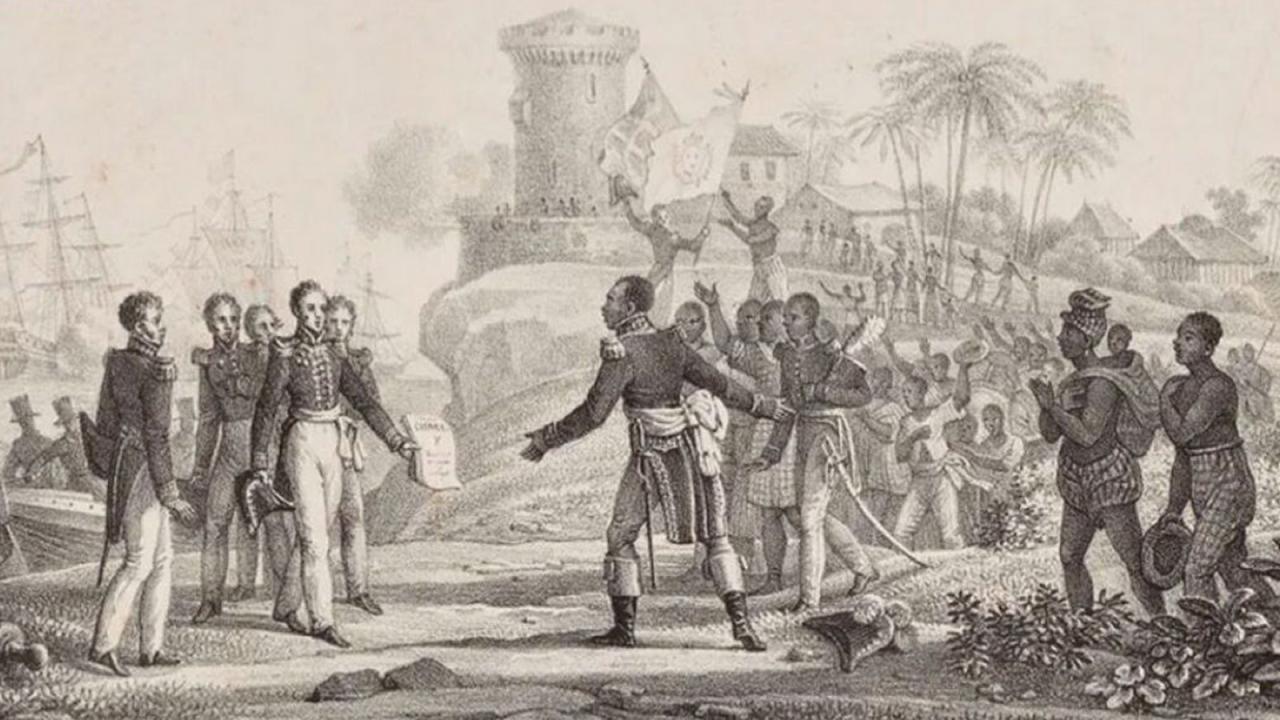
How a French Bank Captured Haiti: A History of Debt and Control
How a French bank captured Haiti isn’t just a catchy title; it’s a chilling truth about the country’s post-independence history. After the Haitian Revolution, a revolution that shook the world and abolished slavery, France, the former colonial power, wasn’t ready to let go.
They demanded hefty reparations, effectively putting Haiti in a financial stranglehold that lasted for centuries. This wasn’t just a story of financial manipulation; it was a story of how a nation’s independence was undermined by a powerful European bank, leaving a legacy of economic hardship and political instability that continues to this day.
The story starts with the French colonization of Haiti, a period marked by brutal exploitation and the enslavement of millions of Africans. The island’s rich soil and the back-breaking labor of enslaved people made it a lucrative source of sugar, coffee, and other commodities.
This wealth, however, came at a tremendous human cost. The French Revolution and the rise of anti-slavery sentiment in Europe led to the Haitian Revolution, a successful fight for independence that ended French rule in 1804. However, France’s influence didn’t disappear with their colonial administration.
They demanded a hefty sum as compensation for the “loss” of their enslaved property, effectively putting Haiti in a debt trap.
Historical Context

The French conquest of Haiti, a brutal and exploitative chapter in history, was a result of a complex interplay of factors, including the burgeoning European colonial ambitions, the island’s strategic location, and the insatiable demand for sugar and other commodities in the European market.
The Rise of French Colonial Power
The 17th and 18th centuries witnessed a surge in European colonial ventures, driven by a combination of economic, political, and ideological motives. France, a major European power, was particularly active in establishing colonies in the Americas, driven by the lucrative trade in sugar, coffee, and other plantation crops.
The island of Hispaniola, now divided into Haiti and the Dominican Republic, was a prime target for French expansion.
Haiti’s Economic and Social Landscape
Haiti’s fertile soil and favorable climate made it an ideal location for sugar plantations, which became the backbone of the island’s economy. However, this economic prosperity was built on the backs of enslaved Africans, who were brought to the island in vast numbers to work on the plantations.
It’s fascinating how history repeats itself, isn’t it? The way a French bank essentially captured Haiti through debt manipulation mirrors the power dynamics in the wine industry. Take a look at this article about a wine producer who put ultra premium rose on the map is now taking another leap for terroir expression – it’s a story of control, but this time it’s about terroir and quality.
Just like the French bank, this producer is establishing a powerful position within the wine world, influencing the narrative and shaping the future of the industry. It’s a subtle power play, but one that can have lasting impact, just like the way a French bank captured Haiti.
The conditions on these plantations were brutal, characterized by inhumane treatment, forced labor, and high mortality rates.
The Dynamics of Power in Haiti
The French colonial government exercised absolute control over the island, enforcing a strict racial hierarchy that placed white colonists at the top, followed by free people of color, and at the bottom, the enslaved African population. The enslaved Africans, who constituted the majority of the island’s population, were denied basic human rights and subjected to systematic oppression.
The Role of Slavery in the French Economy
Haiti’s sugar plantations played a crucial role in the French economy, generating enormous wealth for French merchants, plantation owners, and the French crown. The profits from the sugar trade fueled the French economy, contributing to the rise of France as a major European power.
It’s chilling to think about how a French bank essentially took over Haiti by manipulating its debt, and it’s equally disturbing that the recent supreme court ruling could soon make gun safety laws even weaker. Both situations highlight a dangerous trend of powerful entities prioritizing their own interests over the well-being of the people.
The Haitian people are still struggling to recover from the bank’s actions, and the weakened gun laws could have devastating consequences for communities across the US. It’s a reminder that we must constantly be vigilant against those who seek to exploit and control others.
“The French colony of Saint-Domingue (Haiti) was the richest colony in the world, producing more sugar than all other European colonies combined.”
It’s fascinating to think about how a French bank, the Banque de France, essentially captured Haiti through a debt scheme. The country’s struggle for independence from France, followed by the imposed debt for the “lost” slaves, led to Haiti’s economic subjugation.
It’s a stark reminder of the lasting effects of colonialism, and it makes me wonder about the current debate on gun control in the US, as the House approves gun control bills including higher age for assault rifles, house approves gun control bills including higher age for assault rifles , which might have a similar impact on future generations.
Perhaps, history can teach us how even seemingly minor decisions can have far-reaching consequences, impacting the lives of people for generations to come.
David Brion Davis, historian
The Haitian Revolution
The Haitian Revolution, which took place from 1791 to 1804, was a pivotal moment in the history of both Haiti and the world. It was a brutal and protracted struggle for freedom and equality, culminating in the establishment of the first independent Black republic in the Americas.
The revolution’s impact resonated far beyond Haiti, inspiring anti-slavery movements and challenging the foundations of colonial rule.
The Role of Enslaved Africans in the Revolution
The Haitian Revolution was fundamentally a rebellion against slavery. Enslaved Africans, fueled by decades of oppression and fueled by the ideals of the French Revolution, rose up against their French masters. They were led by a group of remarkable figures, including Toussaint Louverture, Jean-Jacques Dessalines, and Henri Christophe, who emerged as skilled military strategists and charismatic leaders.
The enslaved Africans’ resilience and determination were crucial to the revolution’s success. They faced formidable challenges, including the brutal suppression by French forces, the threat of disease, and the internal divisions within the revolutionary ranks. However, they were ultimately victorious, securing their freedom and establishing an independent nation.
The Impact on French Interests in Haiti
The Haitian Revolution had a devastating impact on French interests in Haiti. The French lost control of a colony that had been a major source of wealth and resources. The loss of Haiti’s sugar and coffee plantations, which had generated significant revenue for France, dealt a severe blow to the French economy.
Furthermore, the revolution’s success demonstrated the fragility of French colonial power and inspired anti-colonial movements throughout the Americas. The French government was forced to recognize Haiti’s independence in 1825, but it imposed a heavy financial burden on the newly formed nation, demanding compensation for the loss of property.
The Significance of the Haitian Revolution
The Haitian Revolution stands as a landmark event in the fight against slavery and colonialism. It was the first successful slave rebellion in history, demonstrating the power of resistance and the potential for enslaved people to overthrow their oppressors. The revolution’s success inspired countless others seeking freedom and self-determination, particularly in the Americas and Africa.The Haitian Revolution also challenged the very foundations of European power and the legitimacy of colonial rule.
It demonstrated that the ideals of liberty, equality, and fraternity, which were at the heart of the French Revolution, could not be reconciled with the practice of slavery. The revolution’s legacy continues to inspire movements for social justice and equality around the world.
The Aftermath of the Revolution

The Haitian Revolution, while a triumph for freedom and self-determination, left Haiti in a precarious position. The newly independent nation faced a multitude of challenges, including a devastated economy, a depleted population, and a complex political landscape. One of the most significant obstacles Haiti encountered was the immense debt it inherited from its colonial past.
The Haitian Debt
France, having lost its lucrative colony, demanded compensation for the loss of its property and the emancipation of enslaved people. This demand materialized as a hefty debt, a financial burden that would weigh heavily on Haiti’s nascent nationhood for decades to come.
The debt, known as the “Indemnity of 1825,” amounted to 150 million francs, a staggering sum at the time. This financial obligation was imposed under the threat of renewed military intervention, a stark reminder of France’s enduring power and its willingness to use it to secure its interests.
- Economic Impact:The debt imposed a significant strain on Haiti’s fragile economy. The newly independent nation, already grappling with the aftermath of the revolution, was forced to allocate a substantial portion of its limited resources to debt repayment. This diverted funds from essential development projects, hindering Haiti’s economic growth and perpetuating poverty.
- Political Influence:France used its financial leverage to exert significant influence over Haiti’s political affairs. The debt became a tool for France to control Haiti’s foreign policy and economic decisions. Haiti was forced to prioritize its debt obligations to France, limiting its ability to engage in independent international relations.
- International Relations:The debt burden also hampered Haiti’s ability to establish positive relationships with other nations. The international community, wary of Haiti’s financial instability and its dependence on France, hesitated to provide assistance or investment. This isolation further hindered Haiti’s development and its integration into the global community.
The French Response

France, despite its defeat in the Haitian Revolution, was determined to maintain its influence over the newly independent nation. This was driven by a combination of economic and political motives, with the French government employing a series of strategies to control Haiti’s resources and limit its economic growth.
Economic Strategies, How a french bank captured haiti
France’s economic strategies were designed to extract maximum benefit from Haiti, even after its independence. This involved a combination of trade agreements and tariffs that heavily favored France, effectively limiting Haiti’s economic growth and development.
- Imposition of Tariffs and Trade Agreements:France imposed a series of tariffs on Haitian goods, making it difficult for Haiti to compete in international markets. In addition, France demanded that Haiti pay an exorbitant indemnity, a debt for the loss of French property during the revolution, further straining the Haitian economy.
This debt was not fully paid off until 1947, significantly hindering Haiti’s ability to invest in its own development.
- Control over Haitian Resources and Trade:France sought to control key sectors of the Haitian economy, particularly agriculture, which was the backbone of the Haitian economy. They forced Haiti to export its raw materials, like coffee and sugar, at low prices, while importing finished goods from France at high prices.
This ensured that France benefited significantly from Haiti’s trade, while Haiti remained economically dependent on its former colonizer.
Role of French Banks
French banks played a crucial role in implementing these economic strategies. They provided financing for the Haitian debt, further entrenching Haiti’s dependence on France. They also invested in key sectors of the Haitian economy, such as agriculture and mining, ensuring that French interests remained dominant.
“The French bankers and merchants saw Haiti as a source of wealth and a market for their goods, and they were determined to maintain their control over the island.”
Conclusion: How A French Bank Captured Haiti
The story of how a French bank captured Haiti is a sobering reminder of the lasting impact of colonialism and the ways in which economic power can be used to control nations. While Haiti has made strides towards economic and political stability, the legacy of the French debt continues to linger.
Understanding this history is crucial to understanding Haiti’s present and its potential for a brighter future. It’s a story that compels us to reflect on the complexities of colonialism, the importance of debt justice, and the need for equitable global partnerships.

